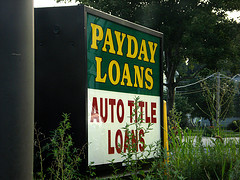Report: Average $951 Car-Title Loan Results In $2,142 In Interest

(Meg)
In its recently released study on car-title loans [PDF], in which the title to the borrower’s car is held up as collateral for loans with typical repayment periods of 30 days, the Center for Responsible Lending found that the average value of one of these loans is around $951, with interest charged at $25 per $100 borrowed.
So if the borrower repays that $951 loan within the 30 days, he will have to pay $238 in interest. That’s quite hefty, but it could be argued that it’s merely the cost of making a short-term, high-risk loan.
Unfortunately, what seems to happen quite frequently is that when the loan comes due, the borrower merely renews the loan, tacking on another $25 per $100 borrowed. So paying a $951 loan back in 60 days results in $476 in interest.
The CRL report cites the president of one of the nation’s largest car-title lenders as saying his average customer renews their loan eight times, which means that original $951 loan ultimately costs the borrower $3,093 in total, with $2,142 of that coming from interest.
Which may explain why there is such a disparity between the size of a typical car-title loan and the value of the car being used to secure that loan. The study found that the median value of a car-title loan is $845 while the median value of a car put up as collateral for a loan is $3,150, meaning the borrower is willing to put up an asset worth nearly four times the cost of the loan.
The Center for Responsible Lending is calling on regulators to take a look at this industry, which the report figures earns around $3.6 billion/year in interest alone. The report suggests that car-title loans be structured as installment loans, with reasonable limits on interest.
“An installment product should include equal monthly payments that amortize the loan over the term,” writes the CRL, “giving borrowers the chance to pay down their debt gradually, and should not include a final balloon payment.”
As a positive example of quality short-term, high-risk lending, the report points to the FDIC’s Small Dollar Loan pilot program, in which 28 banks around the country offered loans valued at below $2,500 with repayment terms of at least 90 days and maximum APR of 36%.
We recommend that anyone considering this kind of loan first determine his/her own ability to pay back the full amount (including interest), since the huge loan-to-value disparity means the lender isn’t really worried whether it’s repaid on time.
Want more consumer news? Visit our parent organization, Consumer Reports, for the latest on scams, recalls, and other consumer issues.

